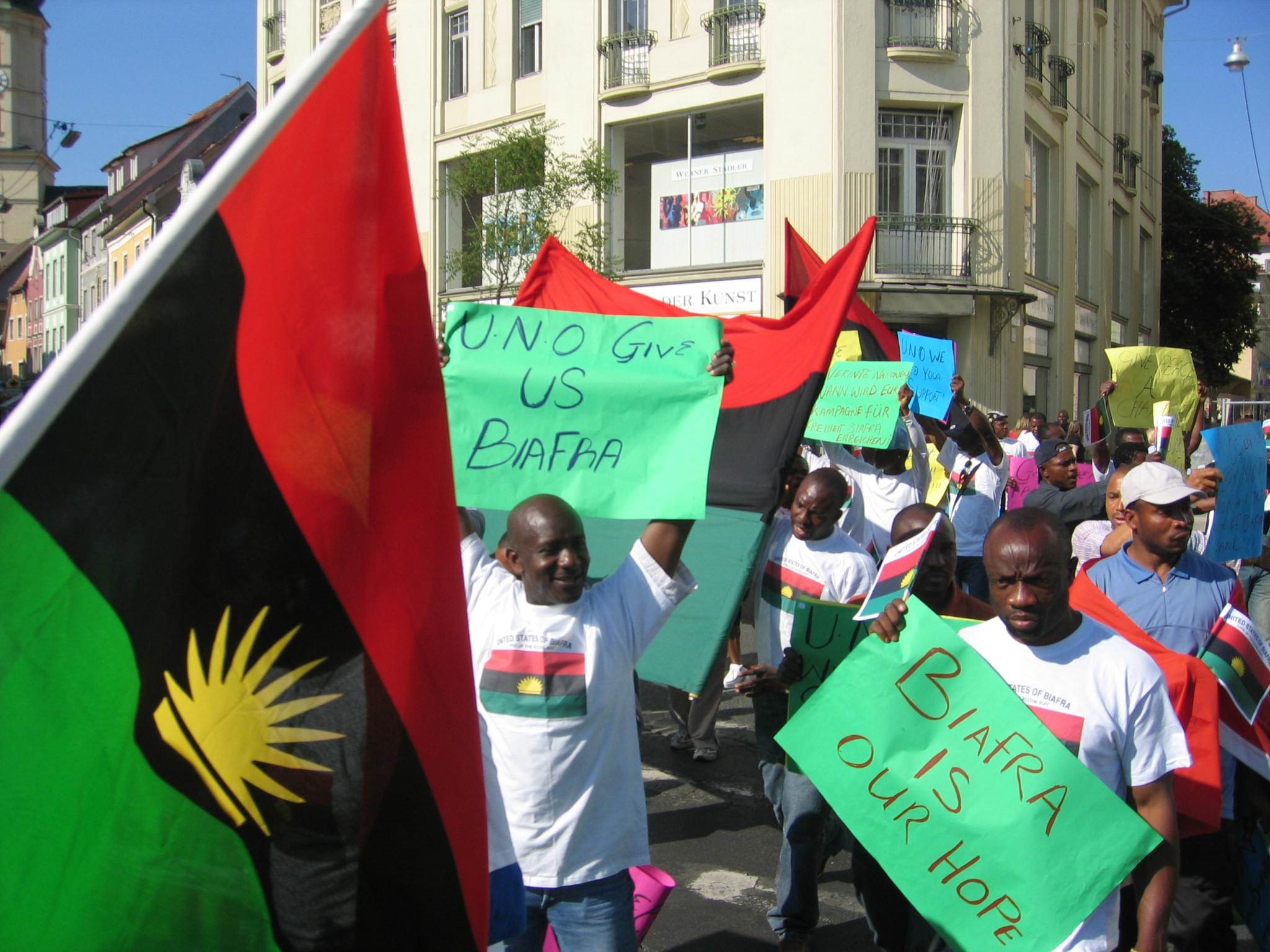Class and the National Question
by Nnamdi Ikeagu
The past few months have witnessed waves of pro-Biafra protests, demanding the release of Nnamdi Kanu of the Indigenous People of Biafra (IPOB). Thousands of youths have marched in virtually every city of note in the South East as well as in Port Harourt, Abuja and Lagos, despite a repressive clampdown with a dozen protesters killed. There have also been demonstrations in several countries across the world.
Kanu who is director of Radio Biafra had 30,000 followers on his facebook page before now but his IPOB had little significance on the ground, unlike the Movement for the Actualisation of the Sovereign State of Biafra (MASSOB) which had collaborated with it to establish Radio Biafra in 2009. He was arrested in November and charged with treason. There are 137 other pro-Biafra agitators being detained.
It is important for working class activists to understand the roots of this resurgence of pro-Biafra agitations as part of the broader crisis of the capitalist system in Nigeria. Questions that need to be answered include: why is there such a revival? What should be the position of activists? How do we relate with the secessionist goal of groups like MASSOB and IPOB?
It would be pertinent to put the emergence of the idea and politics of Biafra in historical perspective to answer these questions.
There are different types of social divisions. The most fundamental however is that of class i.e. the division between the rich and mighty few and the poor, dominated majority. It is however always in the interest of the few rich to play on the identities they share with “their” poor people (e.g. religion, race and ethnicity) so as to keep working class-people divided and as bargaining chip in the bosses’ competition with other bosses for overall dominance.
The coup and counter-coup of 1966 were ignited by the crisis borne out of the ethnic identity politics of the country’s “founding fathers”, in which none of the contending and collaborating regional parties was strong enough to wield hegemony. The massacres of about 30,000 Igbos in the north, in 1966-67 marked a tragic turning point, for many poor toiling Igbos, who returned home convinced of the need to secede.
But the bosses on both sides of the divide of a 30-month civil war that claimed over 2million lives were more interested in foisting their control on the oil fields in the Niger delta. None of their children was in harm’s way either in the line of fire or from starvation. When Chukwuemka Ojukwu would flee before the fall of Biafra for example, he went with members of his family. While Igbos who did not have connections lost all what they had forever, he managed to secure the return of his family properties in a number of cities.
The earlier resurgence of Biafra agitations a decade back, then stirred by MASSOB fed on the frustrations of millions of Igbo youths with a capitalist system that was not working. The neoliberal agenda of global capitalism pushed through by the Chief Olusegun Obasanjo-led PDP government had made life unbearable for working class-people as a whole. Privatisation, cuts in the funding of social services and deregulation had led to skyrocketing costs of living.
Ideology and history are very important elements of how people think and conclusions they reach. In the absence of a strong socialist alternative in the form of revolutionary programmes advanced by organisation rooted in the working masses, ethnicised interpretations by middle class elements such as Ralph Uwazuruike were welcomed by enthusiastic working class-people, particularly youths.
It was not only in the south east that such ideologies were held on to. In the south west, south south and different parts of the north, the histories of ethnic identity politics of the bosses fed the fires of illusions by well-meaning even if misguided strata of change-seeking people.
Nnamdi Kanu has seized the gauntlet from Uwazuruike, at a time that the economic woes of capitalism are even far worse than they were when MASSOB came into prominence. His continued incarceration, illegally, by the state has helped to increase his profile as a supposed freedom fighter. IPOB is likely to grow in leaps and bounds in the short-term and the agitation for Biafra is not likely to go away.
But, it is imperative to point out that there is little that an IPOB agenda has to offer working class-people in the south east. Nnamdi Kanu might be Igbo, but he is not one of us. He was born with a silver spoon as the son of a traditional leader. He schooled abroad because he comes from a wealthy home and his stated ideas on governance are anti-democratic.
As socialists, we support the right of oppressed peoples to fight for their liberation, up to and including the right to secede. But the people in question have to be the poor working masses and not representative of the bosses who play the ethnic identity card.
Workers, irrespective of their nationalities share something in common; being exploited by the bosses. In unity lies our strength. We should come together, and stand together in a united struggle against the bosses of all nationalities and ethnic backgrounds. It is in fighting against the bosses’ capitalist system, overthrowing it and building a socialist society based on solidarity and cooperation, that we will bring an end to all forms of discrimination and marginalisation.
In this struggle, we will defend the democratic rights of those who fight against this unjust system, even if on the basis of such divisive ideologies as ethnic nationalism, while pointing out the limitations of their politics to the working masses. We thus unequivocally demand the immediate release of Nnamdi Kanu and all pro-Biafran protesters being held by the Nigerian state for exercising their right to protest.









